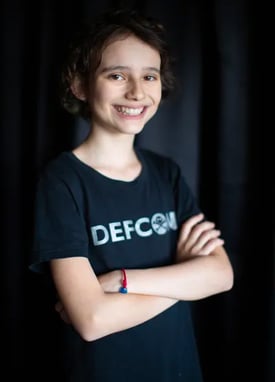Over the last twelve months our team has ramped up the number of public CMD+CTRL Cyber Range events we deliver at conferences, OWASP meetings, and Meetups. The feedback we have received has been great - people love learning how to hack in simulated, free form environments. In some cases the feedback we receive is so good that we need to share it with others in the form of profiles like Brandon Evans and Andre Gott.
As much as we love seeing the uptick in interest from these events, we continue to see untapped resources that the industry as a whole must continue to train up. One of the groups needing the most help are the hackers of tomorrow - young adults. Luckily we recently had a naturally curious and talented emerging hacker participate in March Hackness and provide great information on how she and her peers are helping advance the interest in a variety of STEAM related activities.
 BiaSciLab is a 12 year old who enjoys a good challenge and recognizes the importance of educating middle school age girls about computer security. To help answer the difficult questions about how to get started, BiaSciLab founded girlswhohack.com to share her passion for hacking with others. We hope BiaSciLab’s guidance helps grow hacking interest among the young adults in your life!
BiaSciLab is a 12 year old who enjoys a good challenge and recognizes the importance of educating middle school age girls about computer security. To help answer the difficult questions about how to get started, BiaSciLab founded girlswhohack.com to share her passion for hacking with others. We hope BiaSciLab’s guidance helps grow hacking interest among the young adults in your life!
Why did you start girlswhohack.com?
BiaSciLab: I found a lot of girls want to get into computer security but don't know where to start. The middle school age is important because that is where many girls decide whether or not to get into tech.
Have you participated in Capture the Flag (CTF) or Hackathon events like March Hackness before?
BiaSciLab: CTFs are one of my favorite things! I have participated in Warl0ck gam3z and Neverlan CTF at DEFCON. BSides Philadelphia has a great crypto CTF every year, and I frequently get a few flags with my local DEFCON 610 group when they do online CTFs. HackTheBox.eu is a fantastic site with plenty of real life challenges that are constantly updated so it never gets boring. This year I also built my own real life small business network CTF for WOPR Summit. The challenge was for hackers to break into the network and exfiltrate the secret files.
How do you find out about the March Hackness and other events you participate in?
BiaSciLab: My local DEFCON group does a lot of CTFs, so I hear about them through them. I also keep an eye out for "kid friendly" CTFs like the Neverlan CTF.
Do you ever feel nervous or concerned about joining CTFs like March Hackness? What would you recommend to others who might feel nervous about a new experience like this?
BiaSciLab: When I first started doing CTFs I was a little nervous, but then I found out that they have similar structures and that made it easy. My goal is not to put any pressure on myself, and to have fun. Just get at least one flag! For beginners, you can always ask for help or get a buddy to work though it with you.
What would you recommend to others who are interested in learning how to think like an attacker but don’t know where to start?
BiaSciLab: If you are just starting out in the hacker world, a great place to get your feet wet is with a local group like DEFCON or other security MeetUps. Conferences are an awesome place to learn as well because there are people who are willing to help you get started on your path and show you some of the ropes.
Outside of technology, what are the most interesting things you’ve learned in your STEAM adventures?
BiaSciLab: I enjoy biology and have found cells and all the tiny organisms to be really interesting. I am starting a project to discover new life forms in the river by my house. There are millions of life forms in a river, but only about 250,000 have been studied and cataloged.
What else would you like the world to know about learning through hacking?
BiaSciLab: Hacking is an important life skill because it teaches you to not only think outside the box, but to smash it!
We hope BiaSciLab’s feedback will inspire other young adults...and adults alike who are interested in a variety of STEAM topics, including hacking and secure coding. If you’re interested in learning more about BiaSciLab or supporting Girls Who Hack, please visit www.BiaSciLab.com, www.GirlsWhoHack.com, @BiaSciLab and @GirlsWhoHack.


